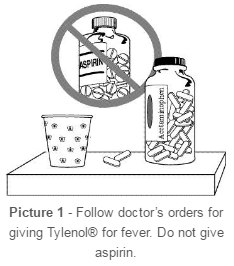Roseola
![]()
Roseola (ROSE–ee-OH-lah) is a common childhood illness caused by a virus. It usually affects children age 6 months to 3 years but can occur in children somewhat younger or older. The illness starts with a high fever that comes on suddenly and can last for 2 to 5 days. Then, the fever goes away and the child gets a fine pink rash, mostly on the chest, back and tummy. The rash may then spread to the arms, legs, neck and face. The rash lasts from several hours to a few days. Other signs of the illness may include sore throat, runny nose, decreased appetite and swollen glands in the neck.
Roseola is contagious (“catching”), and other children can get it while the infected child still has a rash. The time between becoming infected and the start of symptoms is 5 to 15 days.
Treatment

Roseola usually goes away without any treatment other than making the child comfortable and reducing fever. Follow your doctor’s orders for giving acetaminophen (Tylenol®) to control fever. Do not give more Tylenol® than your doctor recommends.
It is best not to give your child a cool bath or sponge bath until after the Tylenol® has had a chance to work. When the skin gets cold, your child may shiver a lot, which raises his temperature.
You do not need to keep your child home from childcare unless the staff decides they cannot care for your child without affecting their ability to care for others.
When to Seek Medical Help
- If convulsions (seizures) occur, call 911 or go to the closest emergency room.
- Call your child’s doctor if the fever does not go away after giving Tylenol®.
- Call the doctor if your child continues to look very sick, acts listless (no energy) or is more fussy than usual.
Prevention
To keep from spreading the virus that causes roseola, practice careful hand washing. Teach children to wash their hands often.
HH-I-314 7/09 Copyright 2009, Nationwide Children's Hospital
